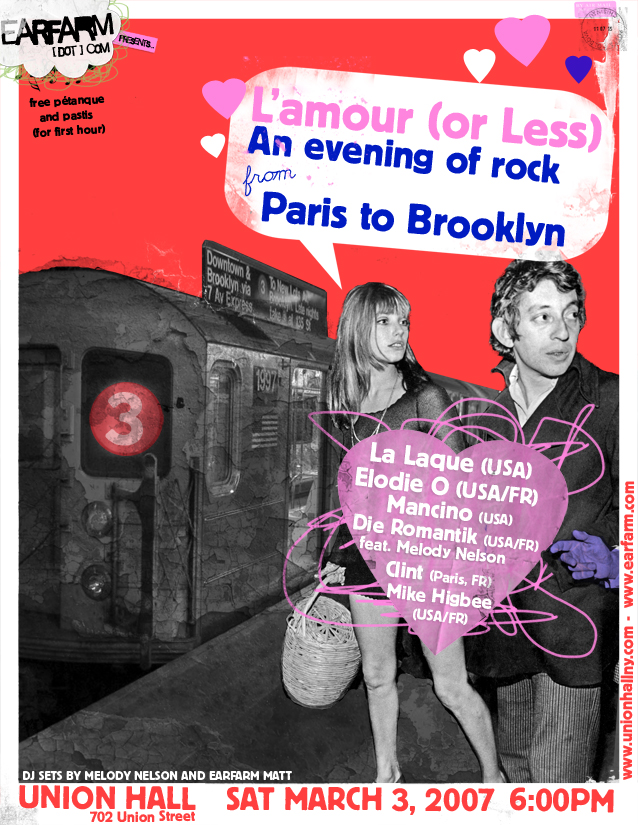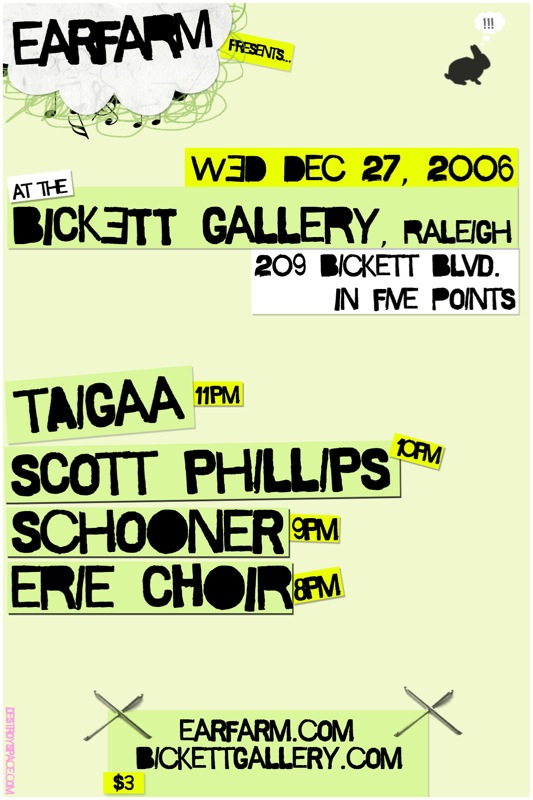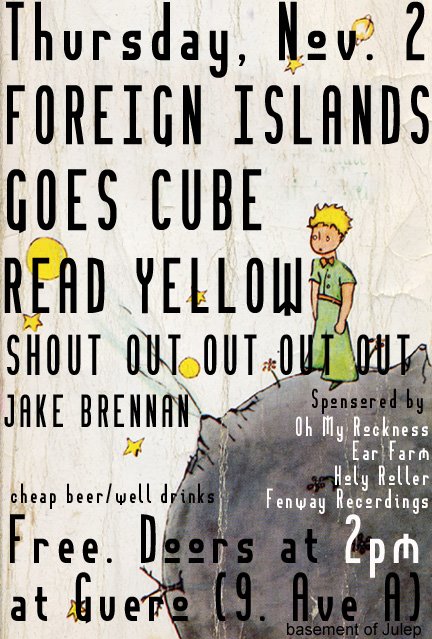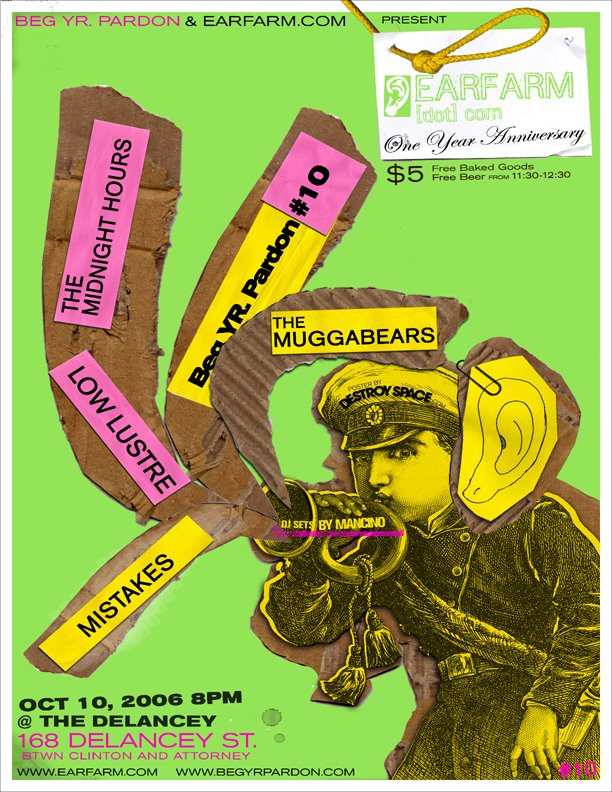 "Joe Hill" by Billy Bragg which clocks in at 8:24
"Joe Hill" by Billy Bragg which clocks in at 8:24
Busy busy busy! It's mid-March, I'm in Austin, TX, and South by Southwest is in full swing. Today, for example, there are at least twenty two different bands/shows I'd like to see. Tops on that list is Billy Bragg who just happens to be playing twice today. He's long been a favorite of mine ever since I first happened upon Back to Basics in a friend's car. Then I went and purchased The Internationale on cassette and I was sold right away, been a huge fan ever since. I've already seen him three times in the past, which is to say, I know he's a fantastic entertainer and dishes out plenty of fun/educational banter. Nice songs too. Anyway, I've got a very full schedule today, tomorrow, and the rest of the week. Expect to read all about it in the coming days (R.E.M. and Dead Confederate last night, holy crap! check back tomorrow for coverage of it). As a result of this packed schedule we're going to simply explore some background about this Joe Hill, who is the subject of the song that's posted here, and try and get a bit more adventurous with next week's 8+. EF music education? Let's go.
From Wikipedia:Joe Hill, born Joel Emmanuel Hägglund, and also known as Joseph Hillström (October 7, 1879 – November 19, 1915) was an American radical songwriter, labor activist and member of the Industrial Workers of the World (IWW), also known as the Wobblies. He was executed for murder after a controversial trial. After his death, he became the subject of several folk songs.
From the AFL-CIO:
Hill was born in Gävle, a city in the province of Gästrikland, Sweden. He immigrated to the United States in 1902, where he became a migrant laborer, moving from New York City to Cleveland, Ohio, and eventually to the West Coast. He was in San Francisco, California, at the time of the 1906 earthquake. Hill joined the Wobblies around 1910, when he was working on the docks in San Pedro, California. In late 1910 he wrote a letter to the IWW newspaper Industrial Worker, identifying himself as a member of the Portland, Oregon IWW local.
Hill rose in the IWW organization and traveled widely, organizing workers under the IWW banner, writing political songs and satirical poems, and making speeches. He coined the phrase "pie in the sky", which appeared in his song "The Preacher and the Slave" (a parody of the then well-known hymn "In the Sweet Bye and Bye"). Other notable songs written by Hill include "The Tramp", "There Is Power in a Union", "Rebel Girl", and "Casey Jones — Union Scab".In 1911, he was in Tijuana, Mexico, part of an army of several hundred wandering hoboes and radicals who sought to overthrow the Mexican dictatorship of Porfirio Diaz, seize Baja California, emancipate the working class and declare industrial freedom. (The invasion lasted six months before internal dissension and a large detachment of better—trained Mexican troops drove the last 100 rebels back across the border.) In 1912, Hill apparently was active in a "Free Speech" coalition of Wobblies, socialists, single taxers, suffragists and AFL members in San Diego that protested a police decision to close the downtown area to street meetings. He also put in an appearance at a railroad construction crew strike in British Columbia, writing several songs before returning to San Pedro, where he lent musical support to a strike of Italian dockworkers.
You can listen to two songs written by Joe Hill HERE, or see a list of influences and tributes to/of Joe Hill HERE (including a long list of musical references to the man).
The San Pedro dockworkers' strike led to Hill's first recorded encounter with the police, who arrested him in June 1913 and held him for 30 days on a charge of vagrancy because, he said later, he was "a little too active to suit the chief of the burg" during the strike. On Jan. 10, 1914, Hill knocked on the door of a Salt Lake City doctor at 11:30 p.m. asking to be treated for a gunshot wound he said was inflicted by an angry husband who had accused Hill of insulting his wife. Earlier that evening, in another part of town, a grocer and his son had been killed. One of the assailants was wounded in the chest by the younger victim before he died. Hill's injury therefore tied him to the incident. The uncertain testimony of two eyewitnesses and the lack of any corroboration of Hill's alibi convinced a local jury of Hill's guilt, even though neither witness was able to identify Hill conclusively and the gun used in the murders was never recovered.
The campaign to exonerate Hill began two months before the trial and continued up to and even beyond his execution by firing squad on Nov. 19, 1915. His supporters included the socially prominent daughter of a former Mormon church president, labor radicals, activists and sympathizers including AFL President Samuel Gompers, the Swedish minister to the United States and even President Woodrow Wilson. The Utah Supreme Court, however, refused to overturn the verdict and the Utah Board of Pardons refused to commute Hill's sentence. The board declared its willingness to hear testimony from the woman's husband in a closed session, but Hill refused to identify his alleged assailant, insisting that to do so would harm the reputation of the lady.
Hill became more famous in death than he had been in life. To Bill Haywood, the former president of the Western Federation of Miners and the best-known leader of the IWW, Hill wrote: "Goodbye Bill: I die like a true rebel. Don't waste any time mourning, organize! It is a hundred miles from here to Wyoming. Could you arrange to have my body hauled to the state line to be buried? I don't want to be found dead in Utah." Apparently he did die like a rebel. A member of the firing squad at his execution claimed that the command to "Fire!" had come from Hill himself.
*above picture from HERE.
Buy The Internationale/Live and Dubious on Amazon.
EAR FARM's 8+ is a weekly feature that showcases songs longer than 8 minutes. In the recent past these songs were featured on EF's 8+:
Van Halen - "Year to the Day"
Kraftwerk - "The Telephone Call"
Neutral Milk Hotel - "Oh Comely"
George Gershwin - “Rhaphsody in Blue"
Múm - "Smell Memory"
Tool - "Lateralus"
Stephen Malkmus and The Jicks - "Real Emotional Trash"
Iron Maiden - "Seventh Son of a Seventh Son"
To see a full list of every song featured in EAR FARM's 8+ click HERE.
13 March 2008
8+
Posted by
Matt
at
11:20 AM
![]()
Labels: 8+
DiggIt! | Add to del.icio.us | Add to Technorati Faves | Reddit
Subscribe to:
Post Comments (Atom)










1 comment:
wow, that is quite an inspiring story for a song!
Post a Comment